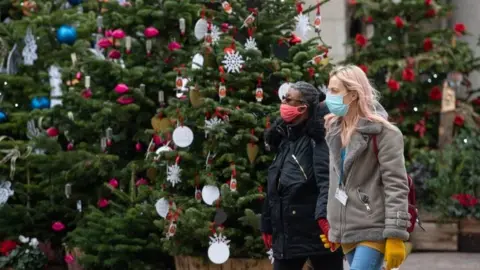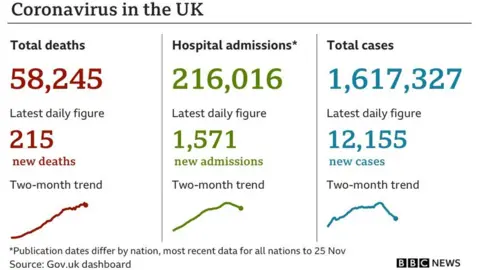Covid: Risk of third wave 'if we don't get balance right' - Raab
 PA Media
PA MediaEngland could face a third wave of coronavirus if ministers do not "get the balance right" with restrictions, Foreign Secretary Dominic Raab says.
He defended the move to a tiered approach when England's lockdown ends on Wednesday, saying the curbs are needed to "bear down" on the pandemic.
MPs will vote on the system on Tuesday, with Labour undecided on its stance.
The PM has told MPs the restrictions will expire on 3 February in a bid to stop a Commons rebellion.
In a letter to all MPs and peers, Boris Johnson said rules could be eased in December, MPs could vote again in January and the tier system could end in February.
But Labour's shadow foreign secretary Lisa Nandy said her party's support was "not unconditional" and they were seeking "clarity" about the tier system.
It comes as a further 12,155 people have tested positive for coronavirus, bringing the UK total to 1,617,327.
There have been another 215 deaths of people who had tested positive for the virus within the previous 28 days, the total under that measure now being 58,245.
England's new system will see regions placed in one of three tiers: medium, high and very high.
In total, 99% of England will enter the highest two tiers, with tight restrictions on bars and restaurants and a ban on households mixing indoors. Only Cornwall, the Isle of Wight and Isles of Scilly will be in the lowest tier.
Elsewhere in the UK, Northern Ireland has begun a two-week circuit-breaker lockdown, while in Scotland each area has been placed in one of five tiers.
In Wales, First Minister Mark Drakeford said pubs, restaurants and bars will be subject to stricter restrictions - which are not yet finalised - in the run-up to Christmas. They will come into force from Friday, 4 December.


When asked whether there could be a third national lockdown, Mr Raab told the BBC's Andrew Marr the government was "doing everything we can to avoid that".
But he said there was a "risk" of a third wave "if we don't get the balance right".
He told Sky's Sophy Ridge on Sunday the tiers would be downgraded in areas where the virus was in retreat, saying: "We are starting with a more restrictive approach than previously with the localised approach.
"But that allows us to ease up when we are confident the virus is going down and stabilised - there's a review every two weeks."
Asked whether the government was looking at breaking counties into smaller areas for the tiers, given differences in rates of the virus within tier areas, Mr Raab said: "The problem is you've got to get the geographic size sufficiently effective that you don't find the smaller enclaves of lower level virus shooting up because they are not subject to the restrictions in the high levels around them."
Labour's Ms Nandy told the BBC's Andrew Marr her party "will act in the public interest".
"We need to know first of all that these measures are tough enough to get control of the virus, otherwise what we are asking businesses to do is go through significant pain, people laid off, some businesses at risk of collapsing, without being able to show that this is worth it," she said.
She added that there also needed to be "proper support" in place.
Meanwhile, in a bid to answer MPs' concerns, Mr Johnson wrote to them outlining a timeline of when - and how - the tiered approach will end.
In his letter, Mr Johnson said:
- Regulations have a "sunset" clause - or expiry date - of 3 February
- Tiers will be reviewed every two weeks, with the first review due on 16 December
- At the end of January, MPs will have another vote on the tiered approach and decide whether measures stay in place until the end of March
- The government will publish the circumstances that need to change for an area to move down a tier
In his letter to the public, the prime minister urged people to support the new system and "work together" with tiering, testing and vaccines.
He said: "We can't blow it now. We can't just throw it all away - not when freedom is in sight."

Analysis
By Ellie Price, political reporter, BBC News
'Tis the season to be jolly careful, said Boris Johnson last week. And he needs to be, with a potential rebellion of his own MPs to worry about.
His letter to all MPs is a change of tone from yesterday when Michael Gove warned it wasn't just ministers who had to take difficult decisions, but MPs too.
This morning, the foreign secretary went for the more reassuring approach and piled on the domestic diplomacy….
"We are listening", he said.
One Tory MP told me this morning that the letter was "nice" but he still hadn't decided how to vote.
Many Tory MPs are waiting for an impact assessment- looking at the economic, social and health effects of the tier system, due to be published on Monday.
So far, Labour haven't said they will support the measures, but they've never voted against Covid health restrictions in the past.


Writing in the Sunday Times, Conservative Damian Green, MP for Ashford in Kent - a tier 3 area - said he will vote against the restrictions on Tuesday.
He said that in Kent there was "an extraordinary divergence in Covid rates" and there was "no logic" in putting the whole county in the same tier.
"The new approach punishes rural areas next to large towns or cities and is bound to reduce public acceptance of these restrictions," he said.
Tory MP Steve Baker said he wanted to see the data the government was basing its new system on.
He tweeted that MPs were "glad to share in the burden of decision", but added: "That's why we need the information necessary to show the government's restrictions will do more good than harm, in full and in time."


- LOCKDOWN LOOK-UP: The rules in your area
- SOCIAL DISTANCING: What are the rules now?
- SUPPORT BUBBLES: What are they and who can be in yours?
- FACE MASKS: When do I need to wear one?
- TESTING: How do I get a virus test?

But writing in the Sunday Times, Deputy Chief Medical Officer for England Jenny Harries warned: "If we relax our guard and the virus spreads too quickly then all the hard-won progress will be undone."
She said that once the lockdown ends in England "there is no other way to keep the virus under control", urging people to "hold on a little longer".
On Saturday, a further 479 deaths within 28 days of a positive test were reported in the UK, bringing the total to 58,030. There were also a further 15,871 positive cases registered in the past 24 hours.



